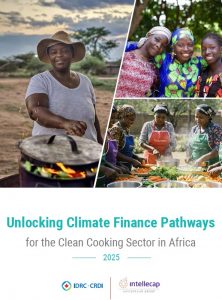Unlocking Climate Finance Pathways for the Clean Cooking Sector in Africa 2025

SYNOPSIS
Sub-Saharan Africa (SSA) faces a clean cooking crisis, with 960 million people— primarily women and girls— relying on traditional, polluting cooking methods. This figure is projected to rise to 1 billion by 2030, making Africa the only region where the deficit in access is increasing.1 Sub-Saharan Africa’s reliance on non-renewable wood fuels contributes 2% of global emissions (1 gigaton of CO₂ annually),2 exacerbating environmental degradation. Meanwhile, women and girls spend several hours a day collecting firewood, which limits their opportunities, increases risks like gender-based violence, and leads to significant social and economic burdens. Despite the proven climate, health, and gender benefits of clean cooking solutions (e.g., LPG, biogas), only 10% of the population has access to modern energy cooking services, highlighting a huge gap in adoption and the urgent need for scaled interventions to address these interconnected challenges. Clean cooking enterprises offer promising innovative solutions; however, their scalability is constrained by financial, operational, behavioral and social norms, and technological challenges.
Achieving universal access to clean cooking in Africa by 2030 requires an annual investment of USD 8 billion. However, just one-fourth of the required capital currently flows into the sector.5 Climate finance plays a crucial role in addressing both climate and clean energy gaps. Public funding, primarily from multilateral institutions, remains the predominant form of climate finance within the clean cooking sector. Although in recent years, private investment in clean cooking has increased, it remains highly concentrated among a small number of firms. A substantial portion of this funding is directed toward a limited range of solutions and key stakeholders, particularly within East Africa. Carbon finance, particularly through Voluntary Carbon Markets (VCMs), has emerged as a transformative mechanism, enabling clean cooking project developers to generate revenue through verified emission reductions. Yet, the high cost of entry, limited buyers, and low carbon credit prices limit Africa’s participation in carbon markets and its potential to bridge the clean energy and finance gap. The continent contributes just a little over 10% of global credits (2016–2021), underscoring the need for broader investment and market access strategies.
This study by Intellecap on behalf of IDRC, deepens the understanding of how clean cooking enterprises can unlock climate finance and access carbon markets to scale their operations and amplify their impact, particularly on women and girls in Africa. Our research on and interactions with clean cooking enterprises, investors, buyers, think-tanks, and carbon market players have highlighted pathways through which enterprises can mobilize capital and drive impact, particularly for women and girls.




